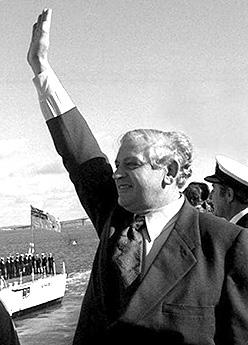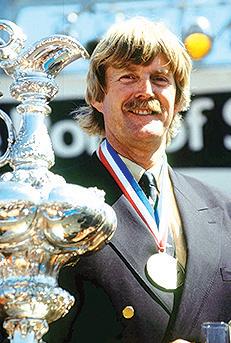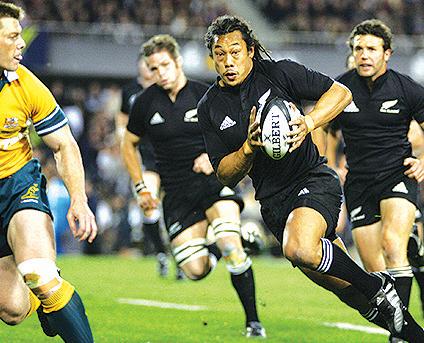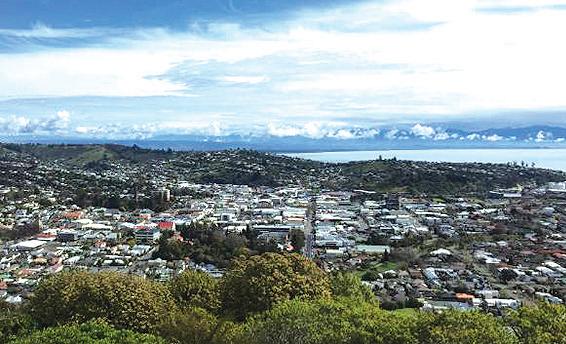
7 minute read
Quote of the Year When you are dead, you do not know that you are dead. All of the pain is felt by others. The same thing happens when you are stupid
Over New Year, thoughts turn to absent friends and family, and memories of past gatherings. In my younger days I enjoyed a gypsy lifestyle as I fished and surfed my way around the country but, often as not, I would end up spending part of my Christmas holiday in the company of Joe Doakes from Nelson. Joe was and still is one of life’s great characters. He has slowed with age, but only in his once prodigious physical ability; mentally he is a sharp as a razor. And when either excited or riled, Joe has a tongue just as sharp.
But don’t look for him in the telephone book. Joe Doakes is not his real name, and he was not born in Nelson—nor has he ever lived there. He visited once and really liked the place, so wanted the memory to stay with him. From that day forward, his response to anyone inquiring of his identity is, “Joe Doakes, from Nelson’. Any time the police run a breath testing operation and they get to his vehicle asking name and address please to be spoken into the breathalyser, the response is, “Joe Doakes, and I’m from Nelson,” and Joe is off on his merry way.
Joe only ever tells anyone what he thinks they need to know, and often without ever being asked. Sometimes loudly. He gets himself into a few good arguments, does Joe.
“You are a robbing bastard,” Joe shouted at the panel beater who had just quoted to clean up a few dings on the Doakes’ limousine— something that was required at least once a year. A similar accusation is routinely directed at the manager of the local service station whenever the diesel price rises.
But there are also plenty of good bastards around according to Joe. Peter Blake was one; so too is Tana Umaga, especially after the best haka ever when the All Blacks played France in Paris back in 2004.
“Mate, that was awesome,” said Joe. “You could feel the power”.
Not many politicians meet Joe’s good bastard criteria, but he always had a salute for Big Norm, despite being violently apolitical.
A nation mourned when Norm Kirk passed away and Joe was part of that tribute. The character of the politician, man or woman, was the only benchmark Joe applied when considering how to vote.
Joe Doakes has been somewhat unconventional in the way that he goes about his business but has done pretty well at nearly every one he has invested in, especially when staying close to the land or to the ocean. Farmer and fisherman, sometimes both concurrently, and always a hard worker.
‘Effort has its own rewards’ is a favourites Joe-ism.
I learned a few good tricks and one or two bad habits working alongside Joe. He was quick to encourage anyone willing to have a go—at anything.
His generosity was amazing, but often backfired on him. Joe was once the proud owner of a 1948 Chev Fleetmaster sedan, all original in a dark royal blue, with shiny chrome bumpers and trim. A couple of Joe’s builder mates asked to borrow it for the weekend to do a run to the big city because their van was full of work tools, and they feared losing it to thieves. Joe was happy to oblige.
The Chev was not returned. The city lights and pleasures of the flesh were almost too much for the builders and when they woke up on a Sunday morning—late of course—they could not remember where they had parked Joe’s car. They caught a train back and offered a groveling apology to Joe, who took it all surprisingly well.
“It’ll show up,” he said. “The cops will get onto it”.
And they did.
Three years later Joe received a call to say that the Chev had been found parked in the middle of a paddock in Ohariu Valley on the outskirts of Wellington!
“That’s strange,” said Joe,” those blokes told me they were going to Auckland”.
I enjoyed diving and fishing with Joe. I remember him once emerging from the water with goggles and snorkel dangling from his neck, a lobster in each hand, a few more clamped on to the thick woolen jersey he was wearing (better than a wetsuit he reckoned), under which there were some nasty looking lumps that turned out to be about half a dozen big paua. Joe was a most efficient hunter/ gatherer.
He owned a few boats in his time and back in the days before the quota system was introduced, Joe fished commercially while running his coastal farm. He did OK, but in rushing between loading the stock truck and getting the boat ready for a day at sea, mistakes were sometimes made. Like heading out without putting the bungs in. Fortunately, he noticed before it was too late, and managed to get back onto the trailer and correct his error.
Not being in a great mood after that rookie mistake, he gave his crewman a hard time. Every minor mistake and slow movement were vocally highlighted and, to make things worse, fishing was not too good that day either. Joe’s young crewman became more flustered as the skipper’s mood darkened. Things came to a head as Joe was trying to retrieve a pot right in close. The deckie missed with the gaff and Joe had to jam the engine into reverse to avoid being washed up against the rocks. The deckie wanted off that boat right then and there, and, with a mighty leap, went over the gunwale, onto the nearest big rock—high and dry.
Joe was both annoyed and impressed—more of the latter as it turned out.
“Why did you do that?” he shouted.
“Because I am bloody scared of you yelling all the time, you are putting me off,” replied the deckie.
“Fair enough,” said Joe. “Sorry mate, it was wrong of me to be taking out my bad mood on you. But I am not in a bad mood any longer… you jumping over the side was a sight I will never forget, so jump back in you little bugger”.
And the crewman did that to a hearty laugh and a friendly slap on the back from Joe, who now had another good story to tell, next time he felt like talking to anyone.
Joe was low key. A massive swell had been building, so Joe and his dog went to check his boat and
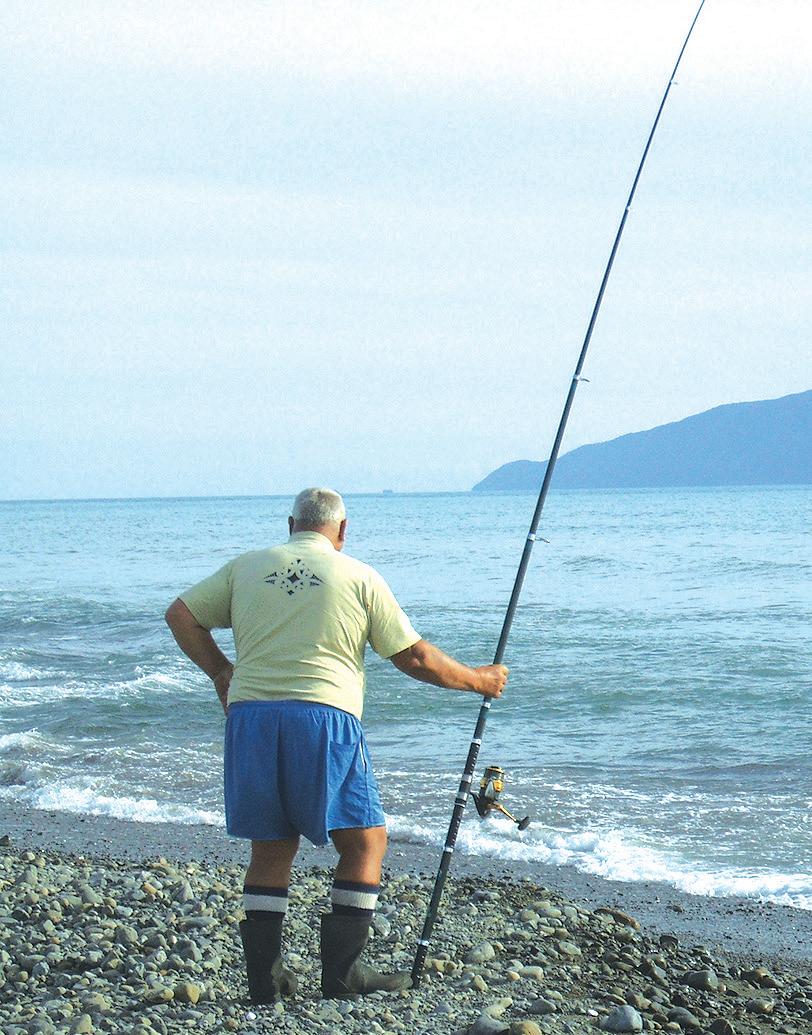
trailer were high and dry. Two young children were playing further down the beach, chasing the incoming foam as it retreated to the waters edge. They scampered and squealed ahead of the next surge. Joe saw the big set coming, leapt off his boat and sprinted down the beach.
Those two kids were almost in the shadow of the wave, which that would have smashed down on them and dragged them under, when Joe swept them up in his arms and ran to higher ground. The wave caught him knee deep and was trying to pull all three of them back. Joe braced himself, all the time talking to the kids— “We’ll be right; we’ll be OK”—until he pulled free of the undertow.
“Best you go home, the sea is pretty angry right now. Come back down when it is calm again,” he said matter-of-factly.
That was Joe.
Joe is now parked up in a rest home, unable to move around much, let alone rescue anyone from a raging sea. He is not in good shape and knows that he doesn’t have too much time left. He lost his wife years ago and they were unable to have kids of their own, so there is only Joe.
But he will be pleased to see me and a few other mates, and we will be pleased to see him. We will pass around the talking stick and embroider a few tall tales and true from the legendary past, sip a few wines when the nurses leave his room, and exchange gifts.
And whilst we are at it, we will say our thank-you’s and maybe our goodbye’s to a good bastard—Joe Doakes, from Nelson.
